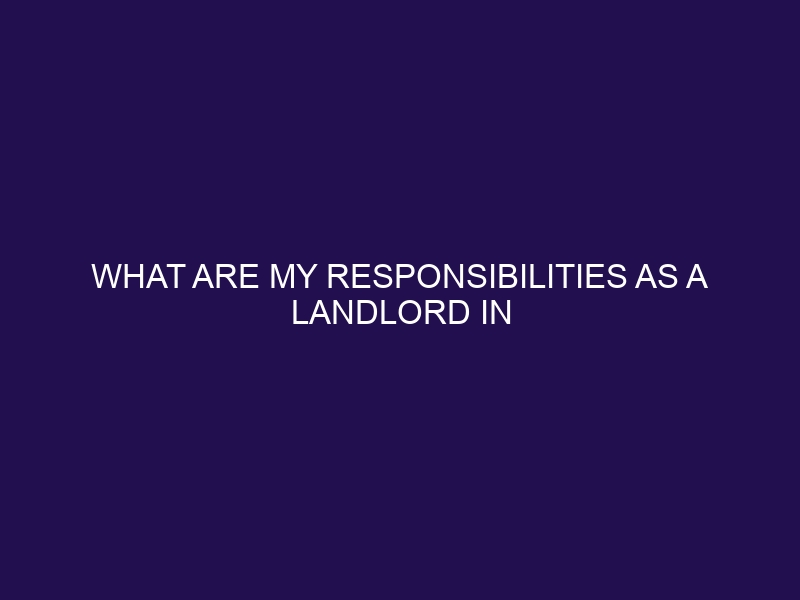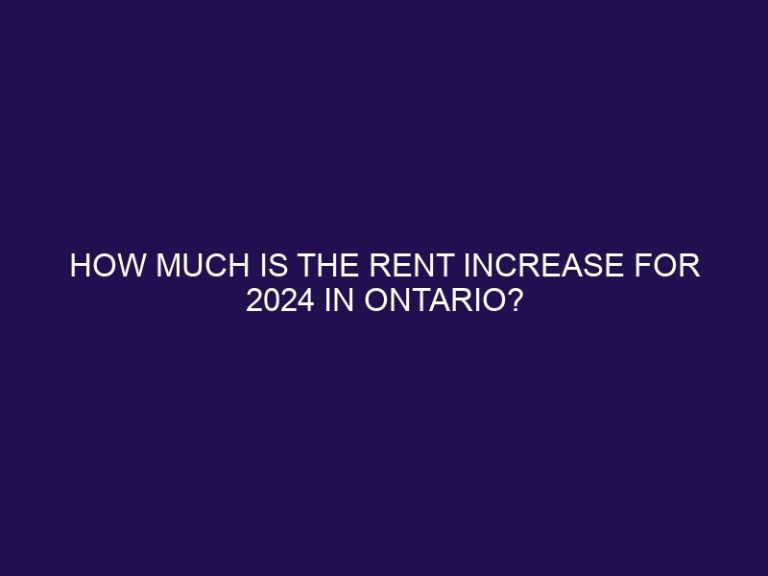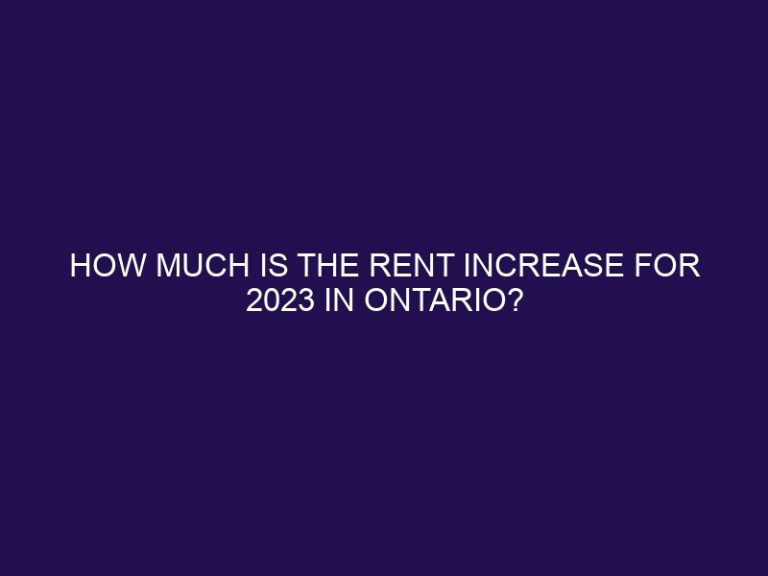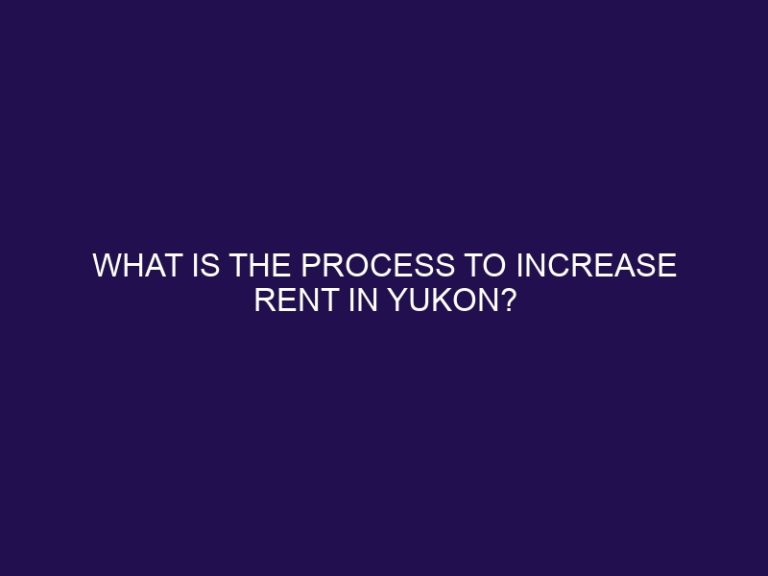What are my responsibilities as a landlord in Quebec?
.jpg)
Being a landlord in Quebec comes with specific responsibilities and obligations that must be fulfilled to ensure a fair and harmonious relationship with tenants. Understanding these responsibilities is crucial for maintaining a positive rental experience for both parties involved. Here is an overview of the essential obligations of landlords in Quebec.
Legal Obligations of Landlords in Quebec:
1. Providing a Safe and Habitable Environment: Landlords are responsible for ensuring that the rental property meets health and safety standards, including proper ventilation, potable water supply, and adequate sanitation facilities.
2. Maintaining the Property: Landlords must keep the rental property in good repair and ensure that it is habitable for tenants. This includes addressing any necessary repairs and maintaining the overall condition of the premises.
3. Ensuring Proper Heating, Plumbing, and Electricity: Landlords are required to provide tenants with functioning heating systems during the cold months, as well as proper plumbing and electrical systems throughout the tenancy.
4. Respecting Privacy and Tenant’s Rights: Landlords must respect their tenants’ privacy by providing notice before entering the rental unit and addressing any concerns related to intrusion or privacy violations.
Financial Responsibilities of Landlords in Quebec:
1. Collecting and Returning Security Deposits: Landlords are allowed to collect a security deposit from tenants, but it must be returned at the end of the lease under specific conditions outlined by the tenancy laws in Quebec.
2. Setting and Increasing Rent: Landlords have the right to set the initial rent for a rental unit, but any increases must comply with the laws regarding rent control and notice periods.
3. Handling Evictions and Lease Terminations: Landlords must follow legal procedures and provide proper notice when evicting a tenant or terminating a lease agreement, adhering to the rules set forth in the Quebec Residential Tenancies Act.
4. Managing Maintenance and Repairs: Landlords are responsible for handling necessary repairs and maintenance tasks in a prompt manner to ensure the property remains in good condition and meets livability standards.
Tenant-Landlord Relations and Communication:
1. Creating and Enforcing Lease Agreements: Landlords are responsible for drafting clear and comprehensive lease agreements that outline the rights and responsibilities of both parties.
2. Dealing with Complaints and Conflict Resolution: Landlords should address tenant complaints and conflicts promptly, promoting effective communication and resolving issues in a fair and equitable manner.
3. Providing Notice and Proper Communication: It is essential for landlords to provide tenants with proper notice for any changes or actions that may impact the tenancy, such as rent increases or repairs.
Resources for Landlords in Quebec:
1. Government Websites and Regulations: Landlords can refer to official government websites and resources to gain a better understanding of their legal obligations and access relevant information regarding tenancy laws and regulations.
2. Landlord Associations and Support Groups: Joining landlord associations or seeking support from local landlord groups can provide valuable resources, networking opportunities, and guidance on effectively managing rental properties.
By familiarizing themselves with these responsibilities and utilizing available resources, landlords in Quebec can ensure a smooth and compliant rental experience while maintaining positive tenant relationships.
Key takeaway:
- Providing a safe and habitable environment: Landlords in Quebec have a legal obligation to ensure that the rental property is safe, clean, and free from health hazards for tenants.
- Handling financial responsibilities: Landlords are responsible for managing security deposits, setting and increasing rent within legal limits, and handling evictions and lease terminations according to the law.
- Maintaining tenant-landlord relations: Landlords must create and enforce lease agreements, address complaints and conflicts with tenants, and provide proper notice and effective communication throughout the tenancy.
Legal Obligations of Landlords in Quebec
As a landlord in Quebec, it’s crucial to be aware of your legal obligations. In this section, we’ll dive into the essential responsibilities you have towards your tenants. From providing a safe and habitable environment to maintaining the property, ensuring proper heating, plumbing, and electricity, and respecting privacy and tenant’s rights, we’ll explore the various aspects of your role as a landlord in Quebec. Stay informed to ensure a positive and legal landlord-tenant relationship.
Providing a Safe and Habitable Environment
Providing a safe and habitable environment is one of the crucial responsibilities of landlords in Quebec. To ensure the well-being of tenants, landlords should take the following measures:
- Regular maintenance: Keep the property in good condition by conducting inspections and addressing any necessary repairs promptly.
- Safe infrastructure: Install and maintain functioning smoke detectors, carbon monoxide detectors, and fire extinguishers.
- Secure premises: Provide adequate locks on doors and windows to ensure the security of tenants.
- Clean and hygienic spaces: Maintain cleanliness, proper sanitation, and pest control within the property.
- Functional utilities: Ensure that heating, plumbing, and electricity are in good working condition.
By fulfilling these obligations, landlords can fulfill their responsibility of providing a safe and habitable environment for their tenants in Quebec. This not only ensures compliance with Quebec’s legal requirements but also contributes to the comfort and security of the tenants.
Maintaining the Property
Maintaining the property is a crucial responsibility for landlords in Quebec. It is essential that landlords in Quebec make it a priority to maintain the property in good condition and promptly address any necessary repairs. In addition, it is equally important for landlords to ensure that the property meets safety standards and provides habitable accommodations for their tenants. To preserve the value of the property, landlords should regularly conduct maintenance tasks such as cleaning common areas and inspecting for potential issues. By doing so, landlords can create a comfortable and safe living environment for their tenants while fulfilling their legal obligations. Remember, scheduling regular inspections and proactively maintaining the property can help detect and resolve issues before they escalate into major problems.
Ensuring Proper Heating, Plumbing, and Electricity
As a landlord in Quebec, it is crucial to ensure proper heating, plumbing, and electricity in your rental property. This responsibility guarantees a safe and comfortable living environment for your tenants. Maintain a functioning heating system, promptly address plumbing issues, and ensure reliable electricity supply. Regular inspections and timely repairs are essential to prevent any inconveniences or safety hazards. By fulfilling these obligations, you not only comply with legal requirements but also cultivate a positive tenant-landlord relationship. Meeting these responsibilities reduces the risk of tenant complaints or legal disputes, leading to a smoother and more successful renting experience.
Respecting Privacy and Tenant’s Rights
Respecting privacy and tenant’s rights is a crucial responsibility for landlords in Quebec. Here are a few key aspects to consider:
| 1. Privacy: | Landlords must prioritize respecting the privacy of their tenants by providing notice before entering the rental unit, except in cases of immediate danger or emergency repairs. |
|---|---|
| 2. Non-Discrimination: | Landlords must adhere to the laws that protect tenants from discrimination based on factors such as race, religion, gender, or family status. |
| 3. Quiet Enjoyment: | Tenants have the right to peaceful enjoyment of their rented space, which means landlords should promptly address any disruptive factors. |
| 4. Security: | Landlords should place importance on tenant safety by providing secure locks and ensuring the property is adequately maintained. |
By respecting privacy and tenant’s rights, landlords can foster positive and harmonious relationships with their tenants.
Financial Responsibilities of Landlords in Quebec
As landlords in Quebec, our financial responsibilities are crucial for maintaining a smooth and fair rental process. In this section, we will explore the key aspects of our financial obligations. From the collection and return of security deposits to setting and increasing rent, handling evictions and lease terminations, and managing maintenance and repairs, we’ll navigate the realm of fiscal responsibilities with confidence and ensure a positive experience for both tenants and ourselves. Let’s dive into the financial side of being a landlord in Quebec!
Collecting and Returning Security Deposits
- Collecting and returning security deposits is an important responsibility of landlords in Quebec. Here are the steps involved:
- When a tenant moves in, request a security deposit as a form of financial protection.
- Ensure the deposit is kept in a separate trust account and not used for personal purposes.
- Inspect the property thoroughly with the tenant when they move in and document any existing damages.
- During the tenant’s stay, maintain regular communication and address any maintenance issues promptly.
- When the tenant moves out, assess the condition of the property and deduct costs for any damages beyond normal wear and tear.
- Provide the tenant with an itemized list of deductions along with the remaining amount of the security deposit.
- Return the security deposit within a reasonable timeframe, typically within 15 days after the end of the lease.
Fun Fact: Collecting and returning security deposits is not only a legal requirement but also helps maintain a positive landlord-tenant relationship.
Setting and Increasing Rent
To set and increase rent in Quebec, landlords must follow certain guidelines and procedures. Here are the steps to consider:
- Evaluate the current rental market to determine the average rent in your area.
- Review the Quebec Rental Board’s regulations to ensure compliance with laws regarding rent setting and increases.
- Calculate the permitted increase percentage based on the guidelines provided by the Rental Board.
- Provide written notice to your tenants of the rent increase at least three months before the proposed increase takes effect.
- Include in the notice the specific amount of the increase, the effective date, and the reasons for the increase if applicable.
- Submit a copy of the notice to the Rental Board.
- If tenants dispute the rent increase, attend a hearing at the Rental Board to present your case.
- Once approved, inform your tenants of the new rent amount and any changes to the lease agreement.
Handling Evictions and Lease Terminations
Handling evictions and lease terminations as a landlord in Quebec involves following a specific set of steps:
- Serve notice: Provide the tenant with appropriate written notice, either for non-payment of rent or breach of lease terms.
- File an application: If the tenant fails to comply, file an application with the rental board, known as the Regie du logement.
- Attend the hearing: Present your case and provide evidence at the scheduled hearing.
- Receive a decision: Once the hearing is complete, receive a decision from the rental board.
- Enforce the decision: If the decision is in your favor, you can proceed with eviction and enforcement of the decision.
It’s important to remember that handling evictions and lease terminations should always be done within the legal requirements and procedures outlined by the Regie du logement. Seeking legal advice and guidance can be useful throughout the process.
Managing Maintenance and Repairs
- Landlords in Quebec have several responsibilities when it comes to managing maintenance and repairs. It is important to promptly address issues to ensure the safety and habitability of the rental property.
- Regular inspections: Conduct routine inspections to identify any maintenance or repair needs.
- Prompt response: Address maintenance requests from tenants in a timely manner.
- Qualified professionals: Hire licensed and qualified contractors to handle repairs to ensure quality workmanship.
- Documentation: Keep records of all repairs and maintenance activities for future reference.
- Emergency repairs: Provide a process for tenants to report emergency repairs outside of regular business hours.
By effectively managing maintenance and repairs, landlords can maintain tenant satisfaction and comply with legal obligations. Regular communication with tenants and proactive maintenance can help prevent more significant issues in the long run.
Tenant-Landlord Relations and Communication
When it comes to renting properties in Quebec, one crucial aspect is the tenant-landlord relationship and effective communication. In this section, we’ll uncover the various sub-sections that delve into this topic. From creating and enforcing lease agreements to handling complaints and conflicts, we’ll explore how both tenants and landlords can navigate these situations successfully. We’ll shed light on the importance of providing proper notice and effective communication throughout the renting process. So, let’s dive into the world of tenant-landlord relations in Quebec!
Creating and Enforcing Lease Agreements
Steps to Creating and Enforcing Lease Agreements in Quebec
-
Include all essential terms and conditions, such as rent amount, payment schedule, duration of lease, and any additional charges or fees.
-
Carefully outline the responsibilities of both parties, including maintenance and repairs.
-
Incorporate clauses pertaining to late payment, eviction procedures, and lease renewals.
-
Ensure compliance with the legal requirements and regulations set by the Régie du logement (Rental Board) when drafting the lease agreement.
-
Provide the tenant with a copy of the lease agreement in both English and French languages, adhering to the necessary legal provisions.
-
Ensure that both parties read and sign the lease agreement, keeping a copy for future reference.
By following these steps, landlords can successfully create a legally binding lease agreement that safeguards the interests of all parties involved, including both landlords and tenants.
Dealing with Complaints and Conflict Resolution
Dealing with complaints and conflict resolution is an essential aspect of being a landlord in Quebec. Here are some steps to follow:
- Listen to the tenant: Give your full attention to their concerns and allow them to fully express their issues.
- Communicate effectively: Maintain open and respectful communication throughout the process.
- Investigate the complaint: Gather all the necessary information and evidence related to the complaint.
- Address the issue: Take prompt action to resolve the problem, whether it involves repairs, addressing noise disturbances, or mediating conflicts between tenants.
- Document everything: Keep a record of all communication, actions taken, and any agreements made.
- Seek professional help if needed: If the issue cannot be resolved amicably, consult legal advice or mediation services for assistance.
Remember, it is important to address complaints and conflicts promptly and fairly to maintain a positive tenant-landlord relationship.
Providing Notice and Proper Communication
Providing Notice and Proper Communication is of utmost importance for landlords in Quebec to uphold a positive relationship with their tenants and comply with legal obligations.
- It is crucial to give advance notice to tenants, informing them about any changes or actions that may impact them, such as rent increases or entry into the property for inspections.
- To ensure clarity and avoid misunderstandings, landlords should always use written communication to provide tenants with important information, including lease terms, rental agreements, notices, and updates.
- Landlords must familiarize themselves with the specific notice periods and methods of communication that are mandated by the Residential Tenancies Act in Quebec in order to follow legal requirements.
- Maintaining open lines of communication is essential. Landlords should promptly respond to tenant inquiries and concerns, and foster dialogue to address any issues that may arise.
Resources for Landlords in Quebec
When it comes to being a landlord in Quebec, there are various resources available to help you navigate the responsibilities and regulations. Here are some essential resources for landlords in Quebec:
- Regie du logement: The official website of the Rental Board of Quebec, providing information on the rights and obligations of tenants and landlords.
- Canada Mortgage and Housing Corporation (CMHC): Offers valuable resources and guides for landlords on various topics, including rental market analysis and property management.
- Rental Market Data: Access data and reports on rental vacancy rates, average rents, and market trends specific to Quebec.
- Revenue Quebec: Provides information on taxes and deductions applicable to rental income in Quebec.
True story:
I had just started renting out my property and was unsure about my legal obligations as a landlord. Thankfully, I came across the Regie du logement website, which provided clear information on the rights and responsibilities of landlords in Quebec. It also guided me on how to handle disputes with tenants and the process for increasing rent. With the help of these resources, I felt more confident and informed in my role as a landlord.
Here are some essential resources for landlords in Quebec that can help you navigate the responsibilities and regulations:
- Regie du logement: The official website of the Rental Board of Quebec, providing information on the rights and obligations of tenants and landlords.
- Canada Mortgage and Housing Corporation (CMHC): Offers valuable resources and guides for landlords on various topics, including rental market analysis and property management.
- Rental Market Data: Access data and reports on rental vacancy rates, average rents, and market trends specific to Quebec.
- Revenue Quebec: Provides information on taxes and deductions applicable to rental income in Quebec.
True story:
I had just started renting out my property and was unsure about my legal obligations as a landlord. Thankfully, I came across the Regie du logement website, which provided clear information on the rights and responsibilities of landlords in Quebec. It also guided me on how to handle disputes with tenants and the process for increasing rent. With the help of these essential resources for landlords in Quebec, I felt more confident and informed in my role as a landlord.
Some Facts About Landlord Responsibilities in Quebec:
- ✅ Landlords must ensure that rental units comply with health, safety, housing, and maintenance standards. (Source: Agrasoy Realty)
- ✅ Rental properties in Quebec must meet municipal property standards, zoning bylaws, fire safety regulations, and local building codes. (Source: Agrasoy Realty)
- ✅ Landlords are responsible for maintaining the rental unit in good repair and fit for habitation. (Source: Agrasoy Realty)
- ✅ Landlords must provide a reasonable supply of fuel, electricity, hot and cold water, and other utility services, unless agreed upon otherwise. (Source: Agrasoy Realty)
- ✅ Landlords cannot interfere with the tenant’s reasonable enjoyment of the premises or seize their property without legal process. (Source: Agrasoy Realty)
Frequently Asked Questions
What are my responsibilities as a landlord in Quebec regarding the condition of the rental unit?
As a landlord in Quebec, it is your responsibility to provide a rental unit that is clean and in good livable condition. This includes making all necessary repairs before the tenant moves in.
Can I change the purpose of the rental unit during the lease?
No, as a landlord in Quebec, you cannot change the purpose for which the rental unit was rented during the lease.
What should I do if a tenant complains about noisy neighbors?
In the case of noisy neighbors, it is your responsibility as a landlord to address the issue and ensure the tenant’s right to peaceful enjoyment of the property. You should take appropriate action to resolve the situation or contact the authorities if necessary.
Am I obligated to compensate the tenant for disturbances caused by factors outside my control?
No, if the disturbance is caused by factors outside your control, such as neighbors or city inspectors, you are not obligated to compensate the tenant. However, if the disturbance is caused by another tenant and you fail to address the issue, the tenant may seek compensation or a reduction in rent through the Tribunal administratif du logement (TAL).
Can I enter the tenant’s rental unit without their permission?
No, as a landlord in Quebec, you can only enter the tenant’s rental unit with their permission, in case of an emergency, if the tenant abandons their responsibilities, or with consent for repairs, inspections, or showings. In all cases, proper notice must be provided.
Is there a grace period for rent payment in Quebec?
No, there is no grace period for rent payment in Quebec. Rent is considered late on the second day of the payment period. It is important to adhere to the specific deadline stated in the lease agreement.







